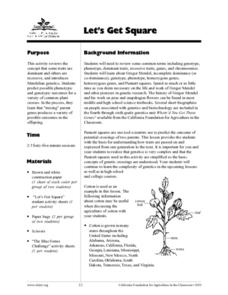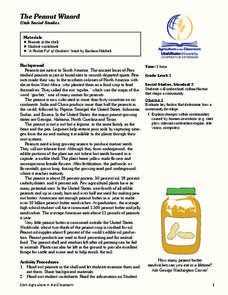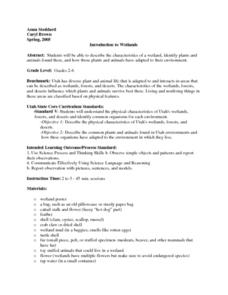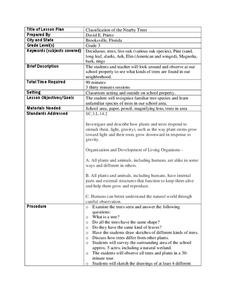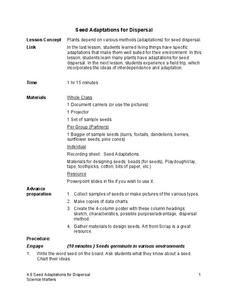Curated OER
The Wetlands
Fourth graders learn what a wetland is, where they can be found, and what types of plants, animals and characteristic are associated with the wetlands. They also participate in an activity to explore and enhance their knowledge of...
Curated OER
What is a Seed?
First graders identify the parts of a seed. For this plant biology lesson, 1st graders are given a seed and identify each part of the seed by using a hand lens. Students plant a seed and graph the growth.
Curated OER
The Dinosaur Diner
Students explore the food chain. In this dinoaur lesson, students identify charactersitics of an omnivore, carnivore, and herbivore. Students sort dinosaur picture/word cards into groups by their eating characteristics. Students also...
Curated OER
Plants and Animals
Learners find common needs between plants and animals. In this plants and animals lesson students compare that both plants and animals need food and water. They also find the differences between plant and animal needs.
Curated OER
Milk and Monarch Butterfly Mania Journal Entry
In this milk and monarch butterfly mania journal entry worksheet, students write a scientific journal entry about the milkweed plant, using the information from another linked website. This worksheet includes many links to other...
Curated OER
Adopt a Tree
First graders describe the characteristics of a tree. In this science lesson plan, 1st graders create predictions about a book they will be listening to, Have you Seen Trees. Additionally, students describe their trees using their 5...
Curated OER
Let's Get Square
Learners predict possible phenotypic and genotypic outcomes for avariety of common plant hybrids. They review and explain the characteristics of dominant and recessive traits and explore Mendelian genetics. Students plot the possible...
Curated OER
The Peanut Wizard
Young scholars investigate the history of the peanut. In this social studies lesson, students read the book A Pocket Full of Goobers and examine the a peanut. Young scholars discuss the peanut's characteristics and take notes on an...
Curated OER
Introducing the Use of Dichotomous Keys to Students
Students are introduced to the use of dichotomous keys as a simple means of beginning scientific observations in nature. They comprehend how to use a dichotomous key. Students distinguish characteristics of a group of organisms. They...
Curated OER
Predator Or Prey?
Students study the concept of predator/prey by researching specific examples of birds. They participate in a concept map/webbing activity to determine different characteristics of birds. They engage in a class discussion about...
Curated OER
Introduction to Wetlands
Students describe the characteristics of a wetland, identify plants and animals found there, and how those plants and animals have adapted to their environment. They visit stations, view a video, and complete a KWL about the wetlands.
Curated OER
Changing Cicada
Students discuss inherited traits and relate to the inherited traits in a cicada. In this cicada lesson, students follow the life cycle of the cicada and observe the changes as it grows. Students discuss the characteristics of the...
Curated OER
Creepy, Crawly Critters
Students study characteristics of insects by creating models from an assortment of materials. They create rubrics showing what an insect must have and create an insect, using a bag of materials. They cut out the puzzle insects included...
Curated OER
Meet the Plants
Students examine the difference between living and non-living things. For this living versus non-living lesson, students complete a KWL worksheet and a Living and Non-Living Chart. They examine a variety of plants and non-plants before...
Curated OER
Classification of the Nearby Trees
Third graders practice using classification techniques to identify local trees. In this plant life instructional activity, 3rd graders discuss how trees differ from other plants and what characteristics are unique to trees alone....
Curated OER
Seed Dispersion of Strawberries and Dandelions
Students investigate how seeds are dispersed on land. In this plant biology instructional activity, students use a dissecting microscope to study strawberry seeds and dandelion seeds, they draw what they see, then create a...
Curated OER
What Do We Learn From Fossils?
Young scholars investigate what a fossil is and how it came to be. In this fossil lesson, students examine pictures of skeletons and identify characteristics that can and cannot be determined by a fossil. Young scholars...
Curated OER
Planets
Third graders discover facts about the planets. In this planets instructional activity, 3rd graders form groups, choose a plant, gather facts about that planet and create a poster with the information. Students learn "tricks" on how...
Curated OER
El Yunque--Tropical Rain Forest
In this rainforest worksheet, students complete 20 fill-ins focusing on their knowledge of El Yunque Rain Forest. The quiz involves wildlife and characteristics of the rain forest.
Curated OER
Species Diversity in Ecosystems with Different Techniques of Land Management
Learners visit numerous places to help in their understanding of Ecology. In this biology lesson plan, students will learn about characteristics and how to identify numerous plants and animals. This lesson allows for many field trip...
Curated OER
Reviving Celery
The classic in-class demonstration using celery dipped into water with food coloring is the highlight of this biology lesson plan. Young scientists discover that organisms are made up cells and have distinguishing characteristics. After...
Curated OER
Space Invaders-Unwanted Neighbors
Students view a short film "If It's Green, It's Good?" and review the characteristics of a healthy ecosystem. After review, they contrast the healthy ecosystem to an unhealthy ecosystem that has been invaded by exotic plant species....
Virginia Department of Education
Classification of Organisms
Searching for the perfect indoor/outdoor activity that allows class members the opportunity to learn about organism classification? Here, pupils research organisms and categorize them according to domain and kingdom over the course...
Science Matters
Seed Adaptations for Dispersal
After a grand conversation about seeds, adaptation, and dispersal, scholars work collaboratively to examine seeds and record their findings on a four-column chart. Small groups share their observations and further discuss seed...
Other popular searches
- Edible Plant Characteristics
- Animal Plant Characteristics
- 3 Plant Characteristics
- Land Plant Characteristics
- Characteristics of Plant Cells








